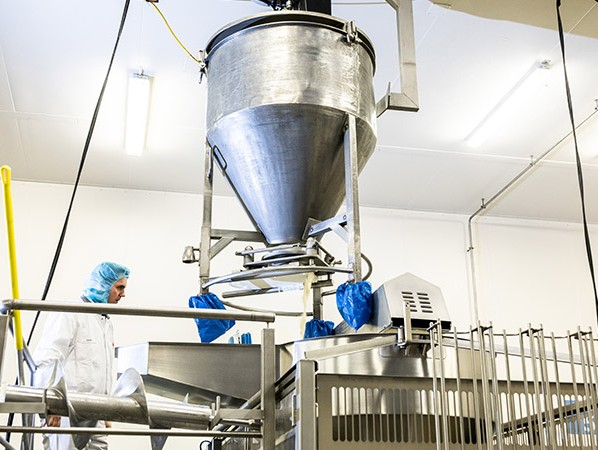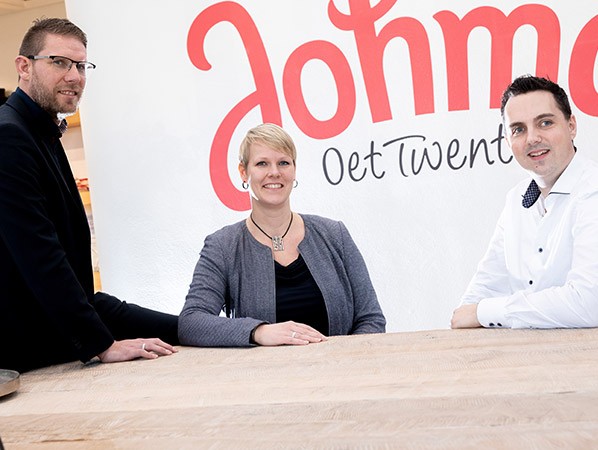
110 stainless steel funnels and 50 standard bins of specialist spreads manufacturer Johma 'from Twente' now have an RSS Ceramic Nano-coating. Thanks to this coating, the waste of spreads left behind in the funnels has been reduced by 59%. Johma and RSS NanoCoatings like to explain more about their approach for this innovation project and the achieved efficiency and return.
The production site of Johma spreads for the consumer market is located in the Twente village of Losser. Here, around 300 spreads recipes are manufactured by (during peak periods) 250 own employees and flex workers. We meet with Project Engineer Daniël van der Woude during the quietest period of the year. "The first three months of the year are relatively quiet. From 1 April, our production is boosted up again as the supermarkets start asking for the summer assortment. If we want to refurbish or implement new developments, we do this during the first quarter. This year, because our company is growing, we are renovating and adapting our warehouse. In 2018, we worked on our innovation project for waste reduction."
Johma wanted to reduce the amount of waste material in the stainless steel funnels and standard bins. After emptying the funnels, too much of the spreads remained stuck to the stainless steel. What we wanted was not just increased productivity but also less cleaning and use of detergents. Daniël tells us more about how the project started: "In 2017, I started my online search for a company that could make our wish come true. Not an easy route because what looked to be promising on the internet, was often less favourable in reality. Until I came across the website of RSS NanoCoatings in Almere and contacted them." The company already had experience in the food sector and there was a mutual click between Daniël and RSS owners Sabine and Rafael Schijff. Sabine happily continues: "We had like-minded ideas about the collaboration, were honest towards each other about expectations, and so we decided to do a test. The spreads manufacturing process combined with nano-coating was new for us as well. Every product has its own properties and may react differently to the coating. That is why doing test runs is vital. And the client wants to see what happens, of course. Nanotechnology is still a quite unfamiliar concept, you first want to get a good feeling about it before you give the final go-ahead. Rafael adds that nano-coating knows various degrees and applications. So, which one was the most suitable for Johma? This proved to be the industrial RSS Ceramic coating, which is slightly thicker and has strong anti-adhesion properties making it easier for the spread to slide through the funnel and which is resistant to daily production processes that contain certain substances and acids.

After Johma had chosen its partner and the product, the lengthiest part of the project began: obtaining the required Foodsafe certification that permits the application of RSS Ceramic coating in food production. Part of the process was a migration test that had to demonstrate that this layer of coating and food don't migrate. "The short basic test normally doesn't test on acidic products. We did include this during the basic migration test at Johma”, says Sabine. "We even did a second test that lasted 10 days. A spread will never stay in a funnel for that long, but we still wanted to know how the coating would react when this would happen. The result was excellent and the Foodsafe certification was given after six months. Now we could really get started!"
The nano-coating was applied by an application company in Rhenen, a partner of RSS NanoCoatings. "This must be done with great precision”, explains Sabine. "The layer that is applied onto stainless steel on the inside of the funnel must have an even thickness. Not all application experts can do this." In total, 110 funnels and 50 standard 200-litre bins, in clusters of 10 + 10, had to be brought to Rhenen and back again. Daniël smiles and continues: "After the installation of the last funnels, we could finally do the measurements to determine the level of efficiency. Before the coating, we had three kilograms of waste left behind in a funnel, in the new situation this has been reduced by 59%. So, you can safely say that all the work really pays off! But we are still obstinate people and continue to 'scratch off' the remaining 41%, just like we did before. The project doesn't have to give a 100% return, we are very happy with this result. The amount of spreads being thrown away is reduced, the productivity has increased, our robots (another innovation project) need less cleaning, and the wastewater purification is less burdened".
Rafael emphasises that the project was a great learning curve for both parties. Daniël agrees: "We were not deterred, the Johma management enjoys doing these kinds of innovation trajectories. RSS NanoCoatings was great in giving their input and solutions". From start to finish, the project took 9 months to realise. Daniël says that the investment pays itself back after one year. Depending on the use, mechanical strain, and wear, the layer of coating must be renewed every three years. Looking back on the innovation trajectory and the achieved result, Daniël is very positive. "Johma grows and innovates, and we continue to find better work method. And as our project shows, we are pioneers when it comes to efficient and smart operations."
Source: © Vakblad Voedingsindustrie 2019